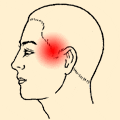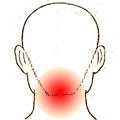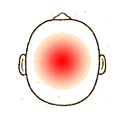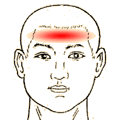I. Questioning / History Taking
As in the West, the doctor will start by inquiring about the patient's immediate complaint, its onset and duration and relevant medical history. He will proceed to systematically inquire about chills and fever, perspiration, appetite and taste, defecation and urination, pain and sleep. Women are likely to be asked about their menses and obstetric history. The first consultation may be lengthy and you may even be asked seemingly irrelevant questions! Each type of problem gives clues to the practitioner about the possible causes for your complaint and how best to treat it. One characteristic about TCM inquiries are the detailed questions concerning present symptoms; a simple seemingly harmless symptom may be significant clinical clue to discerning what the problem is. A song created by Zhang Jiebin (1563-1640) in the Ming Dynasty called the "Ten Questions Song" was used as an outline for guiding TCM practitioners about what questions to ask their patients. It was later supplemented by other TCM practitioners.
Ten Questions Song
First ask hot and cold, second ask sweat,
Third ask head and body, fourth ask stools and urine,
Fifth ask food and drink, sixth ask chest,
Seventh ask hearing, eighth ask thirst,
Ninth ask old disease, tenth ask cause.
In taking medicinals, what changes appear.
Women especially, ask the time of menses, slow, fast, block or flood.
For children, add experience with measles and chicken pox.
(*Practical Diagnosis in Traditional Chinese Medicine, Deng Tietao, 1999 p.64) |
|
The TCM practitioner will commonly ask questions about the following symptoms.
| |
 Chills and fever Chills and fever
Inquiring about a person's reaction to cold and heat can help to distinguish between external or internal damage causes of illness, and to identify diseases of the interior or exterior and yin or yang.
 Perspiration Perspiration
Sweat is created by yang qi steaming and transfoming yin fluids, which becomes evident when emerging from sweat pores on the surface of the body. The doctor will ask whether the patient sweats or not. If yes, the following questions about when, where and how much the patient sweats are asked. By inquiring about patterns of perspiration, one can differentiate if the evils or vital energy(qi) is abundant or weak and whether the sweat pores are opened or blocked. One can also know about the depletion and abundance of qi and blood.
 Appetite, thirst and taste Appetite, thirst and taste
The body's organs depend upon food and water for nourishment, which are sourced from the spleen and stomach to create nutrient essence. Questions about thirst, appetite and taste reveal the status of the functioning of these organs.
 Defecation and urination Defecation and urination
The spleen and stomach govern the reception of water and food, and perform digestion and transformation functions to turn them into nutrient essence used by the body. The kidneys, large intestine, triple burner and urinary bladder are all involved in the urination and defecation processes and interact with the spleen and stomach. Hence, by inquiring about stools and urine, the practitioner can find out about the functioning of all these organs.
 Pain Pain
Pain is one of the most common complaints of patients. Apart from a thorough understanding of the history and accompanying symptoms and signs, TCM focuses on the nature and locations of pain. The nature of the pain helps to identify its etiology (cause) and pathology, while locality of the pain helps to determine which organs and meridians may be affected.
E.g. The location of headache pain can indicate problems with different meridians.
| |
 |
 |
 |
 |
| Leg Shao Yang Gall Bladder Meridian |
Leg Tai Yang Bladder Meridian |
Leg Jue Yin Liver Meridian |
Leg Yang Ming Stomach Meridian |
 Sleep Sleep
The Lingshu (The Vital Axis) states: "When yang qi is at its limit and yin qi is abundant, one's eyes are closed. When yin qi is at its limit and yang qi is abundant, one is awake." If yin and yang are in harmony, one's sleep is normal. By asking about sleep patterns, the practitioner can gather clues about whether the symptoms are of a excess (shi) or deficiency (xu) type syndrome. Sleep patterns also may give clues as to what evils have invaded the body or if a problem with qi (vital energy) flow is present.
 Sex and reproductive system Sex and reproductive system
The TCM doctor will ask women about their menstrual cycle, vaginal discharge, pregnancy and childbirth history. These are the basis of female physiology and closely related illnesses. Men may also be asked about any problems they may be experiencing such as ejaculation problems or problems they encounter when having sex.
 Obtaining a history in children Obtaining a history in children
According to the TCM viewpoint, children's bodies are composed of immature yin and yang. Their organs are fragile and delicate, therefore, they are easily invaded by exogenous evils which can cause diseases such as influenza and the common cold. Digestive problems are also common. Because children are experiencing rapid growth and development, the course of illness they experience can also change rapidly allowing them to heal more easily. Special attention is paid by TCM practitioners to these characteristics of development when examining a child. |
|